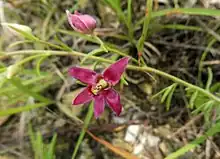| Krameria lanceolata | |
|---|---|
 | |
| Scientific classification | |
| Kingdom: | Plantae |
| Clade: | Tracheophytes |
| Clade: | Angiosperms |
| Clade: | Eudicots |
| Clade: | Rosids |
| Order: | Zygophyllales |
| Family: | Krameriaceae |
| Genus: | Krameria |
| Species: | K. lanceolata |
| Binomial name | |
| Krameria lanceolata | |
Krameria lanceolata, commonly called trailing krameria,[1] is a flowering plant in the rhatany family (Krameriaceae). It is native to North America, where it is found in the southwestern and south-central United States, and the state states of Chihuahua and Coahuila in Mexico. It has populations disjunct eastward in the U.S. states of Florida and Georgia on the Coastal Plain.[2][3] Its natural habitat is in sandy or rocky calcareous grasslands.[4][5]
Krameria lanceolata is an herbaceous perennial that grows decumbent along the ground. It produces purple-red flowers in late spring through the summer.[4]
References
- ↑ USDA, NRCS (n.d.). "Krameria lanceolata". The PLANTS Database (plants.usda.gov). Greensboro, North Carolina: National Plant Data Team. Retrieved 26 January 2018.
- ↑ Alan Weakley (2015). "Flora of the Southern and Mid-Atlantic States".
- ↑ "Krameria lanceolata". County-level distribution map from the North American Plant Atlas (NAPA). Biota of North America Program (BONAP). 2014. Retrieved 27 January 2018.
- 1 2 Krameria lanceolata Flora of North America
- ↑ Diggs, George; Lipscomb, Barney; O'Kennon, Robert (1999). Flora of North Central Texas. Botanical Research Institute of Texas. p. 750.
This article is issued from Wikipedia. The text is licensed under Creative Commons - Attribution - Sharealike. Additional terms may apply for the media files.